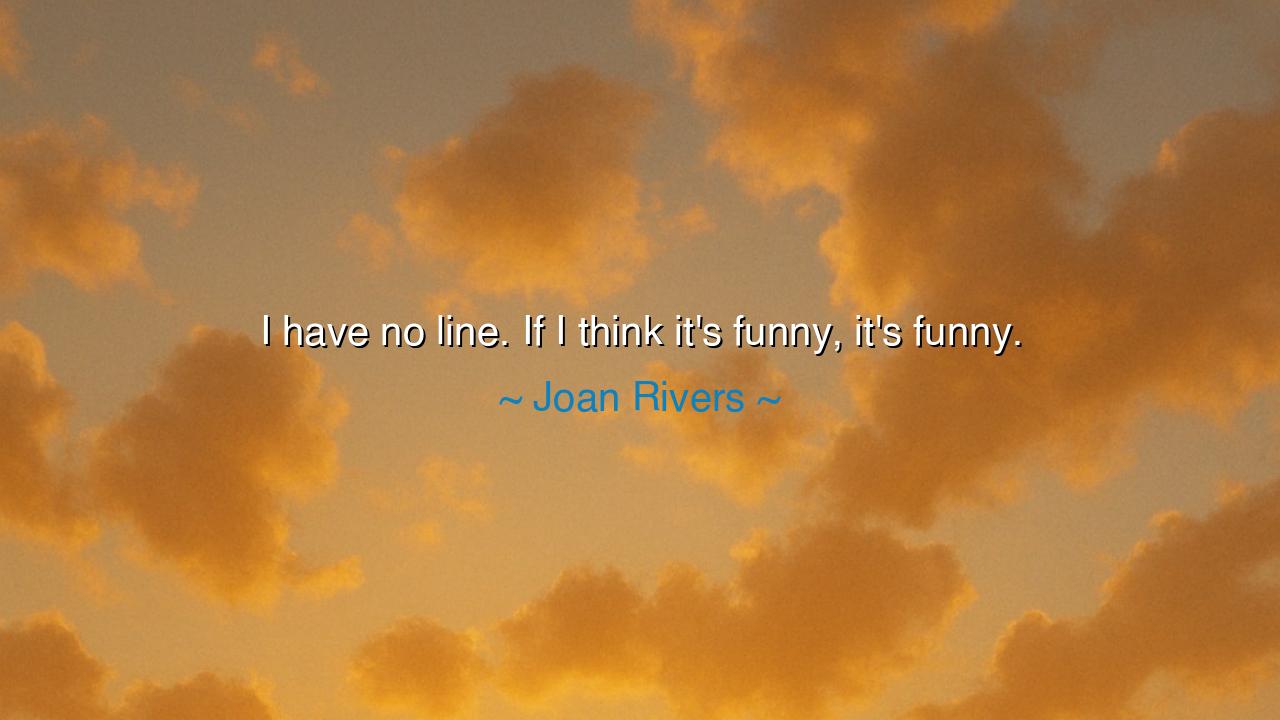
I have no line. If I think it's funny, it's funny.






The words of Joan Rivers—“I have no line. If I think it’s funny, it’s funny.”—thunder with the fearless spirit of a woman who made laughter her weapon, her truth, and her rebellion. Beneath their sharp simplicity lies an eternal creed for every artist and truth-seeker: that honesty in expression is the highest form of courage. Rivers, the queen of transgression, speaks here not merely of comedy, but of freedom—the refusal to bow before the false gods of politeness, fear, or approval. Her declaration is both defiant and sacred: there is no forbidden ground for truth, if that truth is illuminated by the light of humour.
To say “I have no line” is to reject the boundaries imposed by society, to declare that art must walk unshackled through every dark corridor of the human soul. Joan Rivers understood what the ancients called parrhesia—the divine right and duty to speak boldly. Where others trembled at the edge of taboo, she stepped forward laughing, wielding her wit like a torch to reveal what others preferred to hide. Her comedy was not cruelty—it was confrontation. By refusing to censor herself, she forced the world to confront its hypocrisies, its fragilities, and its secret fears. For the comedian’s task, as old as the theatre of Aristophanes, is not to soothe but to awaken.
Rivers was not born into a world that welcomed her voice. In an age when women were expected to be charming, soft, and small, she chose to be blunt, unflinching, and loud. Her laughter broke through the walls that confined her gender, and her sharp tongue became a sword of truth. Every time she said what others dared not, she reminded her listeners of their own silent thoughts—the ones they suppressed out of shame or fear. Like the jesters of medieval courts, who mocked kings to speak truth to power, Rivers’ comedy carried the essence of ancient wisdom: that laughter is the language of liberation, and that humour often reveals what solemn speech cannot.
The origin of this quote lies in her philosophy of comedy itself. She believed that humour must emerge from authenticity, not moral calculation. To her, if something made her laugh—if it sparked recognition, shock, or honesty—it was already worthy of being shared. Her approach was raw, instinctive, and dangerous, for she knew that laughter is not always comfortable. But it is precisely in discomfort that we grow. Like the playwright Euripides, who scandalized Athens with his portrayals of flawed gods and rebellious women, Rivers dared to portray humanity not as it wished to be seen, but as it truly was. She shattered illusions, and in the debris, truth gleamed.
There is a deep moral paradox in her words, for those who misunderstood her saw only vulgarity, never the courage beneath. Yet, she knew—as all wise artists know—that boundaries exist to be tested. Without those who risk offence, society grows stagnant and dishonest. True humour, like philosophy, must disturb before it enlightens. The laughter that changes the world does not come from comfort, but from confrontation. Rivers’ “no line” was not recklessness—it was trust in instinct, the faith that if a moment feels genuine, it deserves voice. She reminds us that silence protects nothing; that to speak, even imperfectly, is to live truthfully.
From this, we may draw a powerful lesson: to live authentically, one must be willing to offend falsehood. Whether in art, speech, or daily life, do not let fear of judgment silence your truth. This does not mean cruelty, but honest daring—the courage to express what you believe, even when the world frowns. To live with a “line” drawn by others is to live in a cage. To erase that line is to reclaim your freedom. Rivers teaches us that humour, like truth, belongs to the brave, not the polite.
So, my friends, remember her teaching: the line does not exist—only courage and cowardice. Speak from your heart. Laugh from your scars. Let your voice wander through forbidden territories, for only those who risk discomfort discover the depths of the human soul. The world will call you reckless, but history will call you fearless. Joan Rivers stood upon the stage of life unafraid to mock, to question, to feel—and in doing so, she proved that the truest laughter is not born of mockery, but of freedom.
For in the end, her words remind us of an eternal truth: that humour is the fire that purifies, that only those who dare to touch it can illuminate the darkness of the world. So live boldly. Speak your truth. And when the world tells you there is a line—laugh, and cross it.






AAdministratorAdministrator
Welcome, honored guests. Please leave a comment, we will respond soon